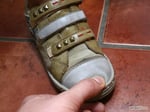It is important to choose the right shoes for your child. Shoes help protect your child's feet from injury, such as from sharp objects like glass or rocks. Shoes also protect feet from the cold ground.
Children should start wearing shoes as soon as they start to walk. Keep these tips in mind when buying shoes for a child of any age.
Size
Children's feet grow quickly. Find a shoe that is one size larger so your child has room to move and grow. It is better to buy shoes that are too big. Do not buy shoes that are too small.
Shape
Do not buy shoes that have odd shapes, like narrow pointed toes or high chunky heels. Shoes should be comfortable, flexible and have plenty of room in the toe area.
Material
Do not buy shoes made of a hard, stiff material. They are not good for your child's feet. They limit movement, which is needed to develop strength and flexibility in the muscles of the feet. Choose a
shoe made out of soft, bendable material. Leather is durable and offers good protection, but may cost more. Cloth shoes may cost less but do not protect your child’s feet as well. Shoes made of
vinyl are flexible but may not last as long.
Soles
When buying shoes, look at the sole. You want a shoe with good tractionthat is flexible and durable. Choose a shoe with a rubber sole and a flat heel.The rubber will help prevent injuries from slips and falls.
Remember: Children will not wear a pair of shoes for a long time because of foot growth and shoe wear. Buying fancy shoes can be costly and is not needed. A good shoe does not have to cost a lot of money.
For more health and wellness information, check out this resource:
https://kidshealth.org/ChildrensWi/en/parents
This sheet was created to help you care for your child or family member. It does not take the place of medical care. Talk with your healthcare provider for diagnosis, treatment and follow-up.



